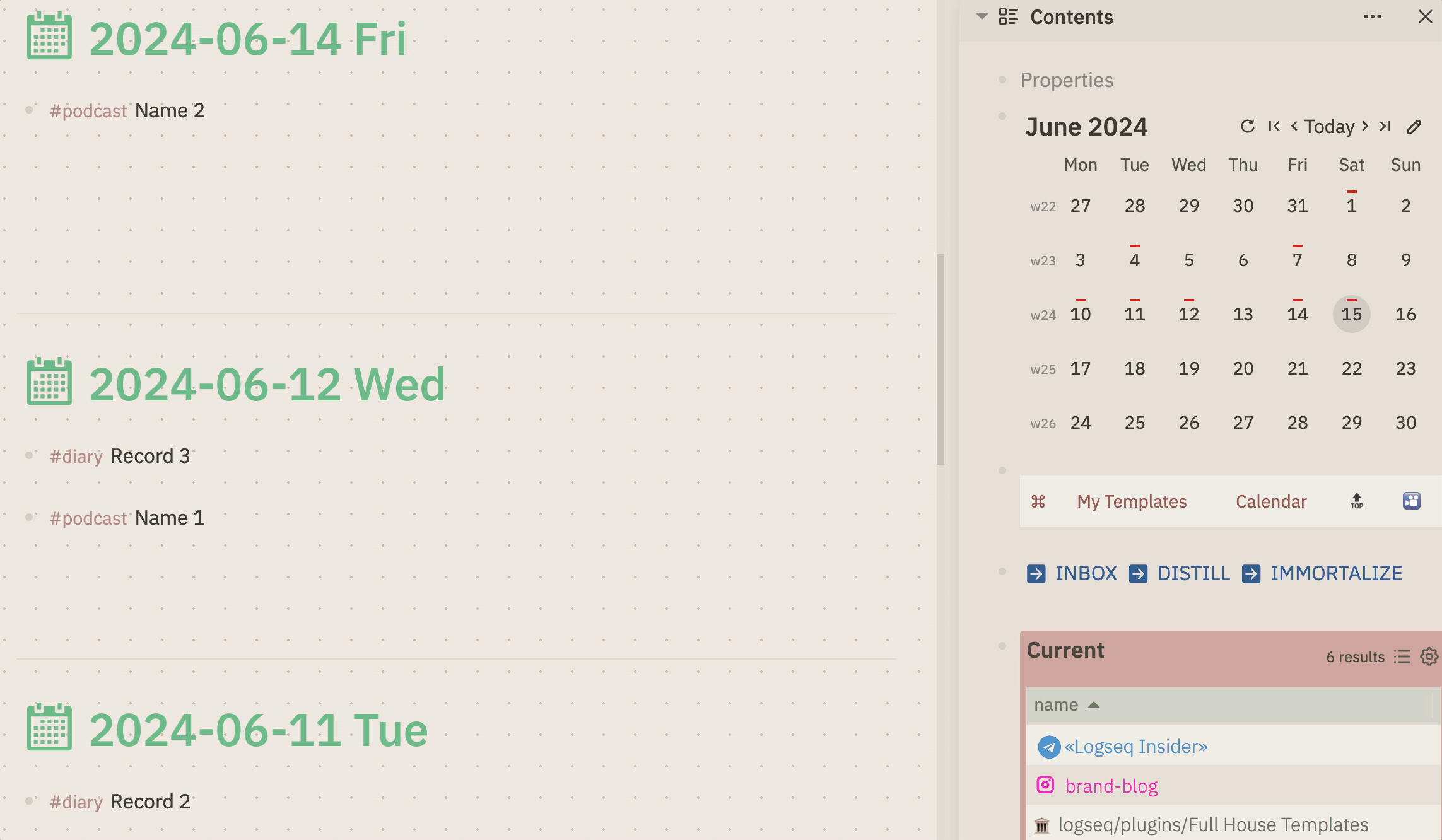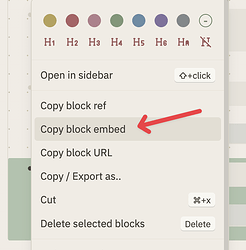Demo

There are two ways of usage the Weekly Pages:
Option A: Via plugin  Full House Templates
Full House Templates
![]() could be used with the Days plugin (the calendar in the sidebar in demo)
could be used with the Days plugin (the calendar in the sidebar in demo)
![]() nice UI for selecting templates
nice UI for selecting templates
![]() written in javascript, so it is easy to adapt to your case
written in javascript, so it is easy to adapt to your case
![]() doesn’t work on mobile
doesn’t work on mobile
![]() Setup instructions are here
Setup instructions are here
Option B: Without a plugin
![]() works on mobile
works on mobile
![]() build with Logseq features only
build with Logseq features only
![]() written in clojure, so it is hard to adapt to your own needs
written in clojure, so it is hard to adapt to your own needs
Let’s concentrate on Option B here
- To prepare the queries create anywhere in Logseq (ex: in «Queries» page) the following queries. I’ll use 2 queries for
#podcastand#diaryrecords. But you can setup your own ones:reference:: #podcast #+BEGIN_QUERY ... #+END_QUERY
Fill the body of queries with the same one code. Insert it betweenreference:: #diary #+BEGIN_QUERY ... #+END_QUERY#+BEGIN_QUERYand#+END_QUERYwith replacing the «…»:{ :inputs [:current-page :current-block] :query [:find (pull ?b [*]) :in $ ?week ?self % :where [?page :block/name ?week] (get-week ?page ?weekStart ?weekEnd) (between ?b ?weekStart ?weekEnd) [?self :block/page ?self-page] (tagged-with-property ?b ?self :reference) ] :rules [ [(get-week ?block ?start ?end) [?block :block/properties ?props] [(get ?props :week-start) ?start] [(get ?props :week-end) ?end] ], [(tagged-with-property ?block ?props-block ?prop) [?props-block :block/properties-text-values ?props] [(get ?props ?prop) ?tag] [(subs ?tag 1) ?tag-name] [?block :block/refs ?ref] [?ref :block/name ?name] [(= ?name ?tag-name)] ] ] } - Create template anywhere in Logseq (ex: in «Templates» page):
- template:: weekly page template-including-parent:: false - - #+BEGIN_QUERY { :query [ :find ?cp ?cb-uuid :in $ ?cp ?cb :where [?cb :block/uuid ?cb-uuid] ] :inputs [:current-page :current-block] :result-transform (fn [[page-name block-uuid]] (def weekStartsFrom (get (js->clj (call-api "get_user_configs")) "preferredStartOfWeek")) (def zerosToWidth (fn [num width] (let [ num-s (str num) zeros (repeat (- width (count num-s)) "0") ] (clojure.string/join (concat zeros num-s)) ) )) (def parseWeek (fn [isoWeek] (let [ regex (re-pattern "^(\\d{4}).*?(?:w|W)(\\d+)$") [_ year weekn] (re-matches regex (str isoWeek)) ] [(int year) (int weekn)] ) )) ;; source: [](https://discuss.logseq.com/t/add-query-input-or-function-day-of-week/18361/12) (def days {0 "Saturday" 1 "Sunday" 2 "Monday" 3 "Tuesday" 4 "Wednesday" 5 "Thursday" 6 "Friday"}) (def weekDayN (fn [date] (def month (quot (mod date 10000) 100)) (def month6 (quot (- month 8) 6)) (def year6 (+ (quot date 10000) month6)) (def yearnum (mod year6 100)) (def century (quot year6 100)) (def d (mod (+ (mod date 100) (quot (* 13 (inc (- month (* month6 12)))) 5) yearnum (quot yearnum 4) (quot century 4) (* 5 century)) 7)) d )) (def weekDay (fn [date] (get days (weekDayN date)) )) ;; naming and algorithm according to [ISO week date](https://www.wikiwand.com/en/ISO_week_date#Algorithms) ;; day of week: 1..7 for Monday..Sunday (def dow-mon (fn [date] (def wd (- (weekDayN date) 1)) (if (<= wd 0) (+ wd 7) wd) )) ;; day of week: 1..7 for Sunday..Saturday (def dow-sun (fn [date] (def wd (weekDayN date)) (if (= wd 0) 7 wd) )) ;; day of week: 1..7 for Saturday..Friday (def dow-sat (fn [date] (+ 1 (weekDayN date)) )) (def dow (case weekStartsFrom 5 dow-sat 6 dow-sun dow-mon )) (def first-week-belongs-to-prev-year (fn [dow-1st-jan] (case weekStartsFrom 5 (= dow-1st-jan 7) ;; is Fri 6 (or (= dow-1st-jan 6) (= dow-1st-jan 7)) ;; is Fri/Sat (or (= dow-1st-jan 5) (= dow-1st-jan 6) (= dow-1st-jan 7)) ;; is Fri/Sat/Sun ) )) ;; day of year: ;; 1..365 or 366 ;; -6..0 when shifts to the previous year ;; weekn: 1-52 or 53 (def doy (fn [year weekn] (let [ dow-1st-jan (dow (str year "0101")) week (if (first-week-belongs-to-prev-year dow-1st-jan) (+ weekn 1) weekn) days-1st-week (+ 1 (- 7 dow-1st-jan)) days-for-weeks (* (- week 2) 7) doy (+ days-1st-week days-for-weeks 1) ] doy ) )) (def leap? (fn [year] (or (= 0 (mod year 400)) (and (= 0 (mod year 4)) (not (= 0 (mod year 100)) ) ) ) )) ;; Jan Feb Mar Apr May Jun Jul Aug Sep Oct Nov Dec (def doys-common [0 31 59 90 120 151 181 212 243 273 304 334]) (def doys-leap [0 31 60 91 121 152 182 213 244 274 305 335]) (def dateFromOrdinal (fn [year doy] (if (< doy 1) [(dec year) 12 (+ 31 doy)] ;; December of the prev year (let [ doys (if (leap? year) doys-leap doys-common) index (->> doys (map-indexed vector) (filter (fn [[i x]] (< x doy) ) ) last first ) month (inc index) day (- doy (get doys index)) ] (if (and (= month 12) (> day 31)) [(inc year) 1 (- day 31)] ;; January of the next year [year month day] ) ) ) )) (def weekDates (fn [year weekn] (if (= year 0) [nil nil] (let [ doy (doy year weekn) [year1 month1 day1] (dateFromOrdinal year doy) [year2 month2 day2] (dateFromOrdinal year (+ doy 6)) ] [ (clojure.string/join [year1 (zerosToWidth month1 2) (zerosToWidth day1 2)]) (clojure.string/join [year2 (zerosToWidth month2 2) (zerosToWidth day2 2)]) ] ) ) )) (let [ [year weekn] (parseWeek page-name) ] (when (not (= year 0)) (let [ [weekStart weekEnd] (weekDates year weekn) uuid (-> (call-api "get_page_blocks_tree" page-name) js->clj first (get "uuid") ) ] (call-api "upsert_block_property" uuid "week-start" (int weekStart)) (call-api "upsert_block_property" uuid "week-end" (int weekEnd)) (call-api "remove_block" block-uuid) ) ) ) ) } #+END_QUERY - Overview heading:: true - INSERT HERE embed ref to #diary query - INSERT HERE embed ref to #podcast query - Copy reference to both of queries via right clicking on corresponding bullet and selecting «Copy block embed»:
…and insert them under «Overview» heading. It should look like:... - Overview heading:: true - {{embed ((666cd068-133c-4b30-9df4-1dd8a94179cb))}} - {{embed ((666cd1b2-f50d-4d88-859b-04f2f9e2efb2))}} - Use this template on every weekly page to setup it.
Notes
- Week start & end dates based on ISO 8601.
- Embedding used to achieve the same looks for every week page.
- Every query has
referenceproperty for easy configuration. - Value of reference property is a tag. This is intentional: to auto rename the value with renaming whole reference tag.
- Currently there is no way in Logseq to avoid copying of query body. Please vote for this feature here and like this comment.
Enjoy!
PS And there is…

